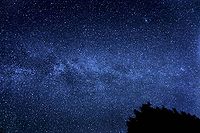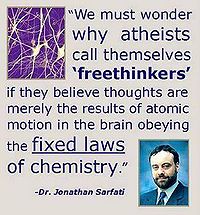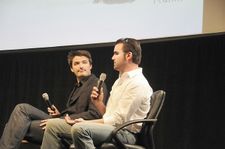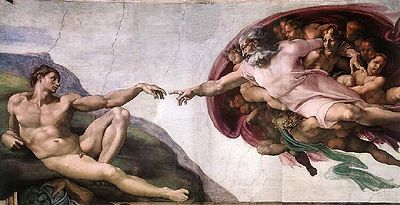Atheism And Personhood
 From Conservapedia
From Conservapedia 
Under a naturalistic, atheist worldview, human beings a collection of atoms that are merely the outcome of an accidental collection of atoms.
In a naturalistic, atheistic worldview, the universe is merely the outcome of an accidental arrangement of atoms and eventually all the suns in the universe will eventually burn out (see: Atheism, agnosticism and pessimism). And unlike Bible believing Christians, there are atheists who actually assert the universe popped into existence from nothing (see: Atheism and the origin of the universe). For instance, the atheist Stephen Hawking asserted: "Because there is a law such as gravity, the universe can and will create itself from nothing".[1]
Contents
The atheist Sam Harris on the problem of personhood for an atheistic worldview[edit]
See also: Atheism and consciousness and Atheism and free will

The new atheist Sam Harris wrote about consciousness:
| “ | Every feature of the human mind and body emerges over the course development: Why is consciousness more perplexing than language or digestion? The problem, however, is that the distance between unconsciousness and consciousness must be traversed in a single stride, if traversed at all. Just as the appearance of something out of nothing cannot be explained by our saying that the first something was “very small,” the birth of consciousness is rendered no less mysterious by saying that the simplest minds have only a glimmer of it.
This situation has been characterized as an “explanatory gap” and the “hard problem of consciousness,” and it is surely both. I am sympathetic with those who, like the philosopher Colin McGinn and the psychologist Steven Pinker, have judged the impasse to be total: Perhaps the emergence of consciousness is simply incomprehensible in human terms. Every chain of explanation must end somewhere—generally with a brute fact that neglects to explain itself. Consciousness might represent a terminus of this sort. Defying analysis, the mystery of inner life may one day cease to trouble us.[2] |
” |

Harris stated about his position that the self is an illusion and a person's sense of self is illusion:
| “ | Illusions are experiences in the mind, but they are not out there in nature. Rather, they are events generated by the brain. Most of us have an experience of a self. I certainly have one, and I do not doubt that others do as well – an autonomous individual with a coherent identity and sense of free will. But that experience is an illusion – it does not exist independently of the person having the experience, and it is certainly not what it seems. That’s not to say that the illusion is pointless. Experiencing a self illusion may have tangible functional benefits in the way we think and act, but that does not mean that it exists as an entity.
I do not think there are many cognitive scientists who would doubt that the experience of I is constructed from a multitude of unconscious mechanisms and processes. Me is similarly constructed, though we may be more aware of the events that have shaped it over our lifetime... Answering the question of who is experiencing the illusion or interpreting the story is much more problematic. This is partly a conceptual problem and partly a problem of dualism. It is almost impossible to discuss the self without a referent in the same way that is difficult to think about a play without any players.[3] |
” |
See also: Sam Harris, atheism, freewill and determinism
Atheist Luke Muehlhauser on human consciousness[edit]
See also: Atheism and consciousness

The atheist Luke Muehlhauser wrote on human consciousness:
| “ | I assume that some seemingly-core features of human conscious experience are illusions, and thus need to be “explained away” rather than “explained.”...
Similarly, I think some core features of consciousness are illusions, and the job of cognitive scientists is not to explain how those features are “real,” but rather to explain why they seem to us to be real (even though they’re not). For example, it seems to us that our conscious experiences have “intrinsic” properties beyond that which could ever be captured by a functional, mechanistic account of consciousness. I agree that our experiences seem to us to have this property, but I think this “seeming” is simply mistaken.[4] |
” |
Atheism and reason[edit]
See also: Atheism and reason
If naturalism is true, then we ought not to trust our capacity for reason for the human brain would be a byproduct of blind/unintelligent natural forces. [5] Therefore, believing in naturalism is self-defeating.
In short, atheism/naturalism and reason are incompatible.[6] See also: Intelligent design and Evolution
C.S. Lewis's argument from reason and for the irrationality of materialism[edit]
See also: Atheism and the brain and Atheism and free will
Clive Staples Lewis, commonly referred to as C.S. Lewis, (b. November 29, 1898, Belfast - d. November 22, 1963, Oxford) was an Irish writer, novelist, essayist, moral mythologist and a world-acclaimed master of Christian apologetics.
Below are some resources on C.S. Lewis' argument from reason:
- C.S. Lewis' argument from reason
- C.S. Lewis and the Argument from Reason by Jay W. Richards, November 25, 2013
- C.S. Lewis and Materialism by John G. West
- C.S. Lewis On The Validity of Reasoning
- C.S. Lewis on Rationality and Materialism
- Atheism and the Inability to Think
- Book Review: C.S. Lewis's Dangerous Idea: In Defense of the Argument from Reason by Victor Reppert
The Christian apologetics website Bethinking.org declares:
| “ | Bereft of the certainty of reason and truth that results from a godless worldview, it seems better for the atheist to seek an alternative. In his book C.S. Lewis’ Case for the Christian Faith, Richard Purtill offers the biblical perspective on reason and its origins:
Christianity offers that man is made in the image of God and from this we gather that our mind is formed in likeness to God’s mind. Thus, we have a reason for our reason which is Jesus Christ, the creator of the universe, Earth, and our mind. Indeed the apostle John describes how 'the Word' (Greek word logos, which can also be translated as 'reason') was with God in the beginning, how reason formed all of nature, and how the incarnate Word came to Earth.[7] |
” |
Atheism and human worth[edit]
See also: Atheism and human worth
As far as atheism and human worth, Ken Hensley wrote:
| “ | It’s clear that we share a universal intuition and strong belief in the unique value of human life. We speak very naturally of people possessing “inherent” value, “high” and “equal” value. We talk about the “dignity” each person “deserves.” We use words like “priceless” to describe human lives. This is simply how we very naturally think and speak.
And of course the biblical worldview makes sense of our experience in this regard. If God exists and we have been created in his image and likeness, then we do possess unique value among created beings. In other words, the Christian worldview provides a metaphysical basis and foundation for what we seem to intuitively know to be true... In accord with the Christian worldview, the truth of our value and dignity as human persons is something God has written on our hearts and etched into our very beings. It’s something we simply know to be true.... But what if the worldview of the modern garden-variety atheist is true? What if you and I really are nothing more than very complicated biochemical machines that appear for a moment, gears spinning, and then disappear forever? What if we really have come from nowhere and are going nowhere? What if we really are nothing more than the product of an entirely impersonal material universe, that we don’t have souls, that we aren’t spiritual beings at all? What becomes of inherent value and dignity, then? Well, it would be an illusion. It would not be true. Objectively speaking, in a naturalist universe we would have no more inherent value than any other aspect of nature. The only “value” we would possess would be what others were willing to grant us in our few moments on this earth.[8] |
” |

Author Randy Alcorn wrote about atheism and human worth:
| “ | In the secular-atheist account: You are the descendant of a tiny cell of primordial protoplasm that washed up on an ocean beach ten billion years ago. You are the blind and arbitrary product of time, chance, and natural forces. Your closest living relatives swing from trees and eat crackers at the zoo.
You are a mere grab-bag of atomic particles, a conglomeration of genetic substance. You exist on a tiny planet in a minute solar system in an obscure galaxy in a remote and empty corner of a vast, cold, and meaningless universe. You are flying through lifeless space with no purpose, no direction, no control, and no destiny but final destruction. You are a purely biological entity, different only in degree but not in kind from a microbe, virus or amoeba. You have no essence beyond your body, and at death you will cease to exist entirely. What little life you do have is confined to a fragile body aimlessly moving through a world plagued by war, famine and disease. The only question is whether the world will manage to blow itself up before your brief and pointless life ends on its own. In short, you came from nothing, you are going nowhere, and you will end your brief cosmic journey beneath six feet of dirt, where all that you will become is food for bacteria and rot with worms. Now, why don't you feel good about yourself? And why don't you show more respect for human life? In the Christian account: From the moment of conception, you and all other human beings are the special creation of a good and all powerful God. You are the climax of His creation, the magnum opus of the greatest artist in the universe. You are created in His image, with capacities to think, feel, and worship that set you above all other life forms. You differ from the animals not simply in degree, but in kind, in your very essence.[9] |
” |
Atheism and the devaluing of human life[edit]

- Atheism and human rights violations
- Atheism and mass murder
- Atheism and abortion
- Atheism and infanticide
- Atheists eat babies meme
Atheists and the eating of babies/children[edit]
- Communist China and baby eating
- Atheists and the eating of babies/children (China, Soviet Union, North Korea and other issues)
Major news organizations reporting on China baby flesh powder scandal[edit]
- Chinese cannibalism of infant flesh outrages the world, Washington Times
- Thousands of pills filled with powdered human baby flesh discovered by customs officials in South Korea, The Daily Mail
- Horrifyingly, Ground Baby Pills Are a Real Thing by Alexander Abad-Santos, The Atlantic
Notes[edit]
- ↑ Hawking atheopathy by Jonathan Sarfati
- ↑ THE MYSTERY OF CONSCIOUSNESS II by Sam Harris
- ↑ THE ILLUSION OF THE SELF: An Interview with Bruce Hood, quote of Sam Harris
- ↑ 2017 Report on Consciousness and Moral Patienthood by Luke
- ↑
- C.S. Lewis' argument from reason
- C.S. Lewis and the Argument from Reason by Jay W. Richards, November 25, 2013
- C.S. Lewis and Materialism by John G. West
- C.S. Lewis On The Validity of Reasoning
- C.S. Lewis on Rationality and Materialism
- Naturalism's Hot Water
- ↑
- C.S. Lewis' argument from reason
- C.S. Lewis and the Argument from Reason by Jay W. Richards, November 25, 2013
- C.S. Lewis and Materialism by John G. West
- C.S. Lewis On The Validity of Reasoning
- C.S. Lewis on Rationality and Materialism
- Naturalism's Hot Water
- ↑ Reclaiming Reason from Atheism by Katie Galloway, Bethinking.org
- ↑ The Problem of Human Worth: How I Evangelize Those Who Doubt or Deny the Existence of God, Part III by Ken Hensley
- ↑ Atheism and Christianity: Two Views on the Value of Life by Randy Alcorn
- ↑ Chinese cannibalism of infant flesh outrages the world, Washington Times, 2014
Categories: [Atheism] [Philosophy] [Psychology] [Five Aggregates]
↧ Download as ZWI file | Last modified: 02/26/2023 03:58:23 | 23 views
☰ Source: https://www.conservapedia.com/Atheism_and_personhood | License: CC BY-SA 3.0
 ZWI signed:
ZWI signed:
 KSF
KSF